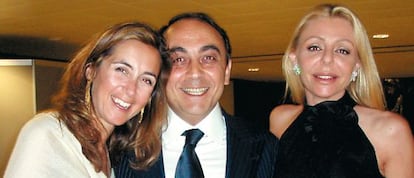Arrested Vatican broker has scores of pending fraud cases in Canary Islands
Giovanni Carenzio embezzled 20 million euros from archipelago's high society

Broker Giovanni Carenzio, who was arrested by Italian police last Thursday and charged with fraud and corruption in connection with the Vatican bank scandal, has scores of pending criminal investigations filed against him in Spain.
Carenzio is accused of defrauding about 20 million euros from families in Gran Canaria and Tenerife. Carenzio's arrival in the Canary Islands is like a movie plot. He had been frequently visiting the Spanish archipelago since the 1980s, and it was during one of those trips that he met a young woman from a wealthy aristocratic family, Dolores Molina de Aguilar, whom he eventually married.
In 1992, the couple moved to Naples, where they became fixtures of the Italian jet set and took part in many charitable activities. Returning to the Canaries, they moved into a luxurious home on Gran Canaria.
Falling back on his wife's contacts, the Neapolitan broker began to interact with la crème de la société. With an intense social life in the Canary Islands, Carenzio seized the chance to help sponsor an expedition organized by Álvaro de Marichalar - the brother of Princess Elena's former husband - to cross the Atlantic on a jet ski. Additionally, in 2007 he organized a dinner in the Alfredo Kraus Auditorium in honor of former US Vice President Al Gore; that activity was attended by 150 guests, including the current Industry, Trade and Tourism Minister José Manuel Soria, himself a Canarian.
His explanations were very similar to other infamous pyramid schemes
As his social life swelled, Carenzio began laying out business deals before the island's wealthy families. His explanations were very similar to other infamous pyramid schemes.
The alleged broker offered his services as an intermediary in the making of major investments, sometimes as high as 300,000 euros, in businesses that were believed to be safe. A 20-percent profit for the investor was guaranteed if he found another venture capitalist on the promise that he too would receive a tidy sum. Those who fell into this financial trap were typically financially inexperienced aristocrats and prominent builders. Because Carenzio was well connected with Canarian high society, he raised no suspicions.
The trust and confidence in the broker, according to sources close to the case, was such that he would sometimes hammer out deals with his victims on paper napkins. But over time, investors began to worry and became wary of Carenzio's frequent apologies. The case exploded in 2011 when the Neapolitan's venture capitalists, who couldn't recover their investment, filed complaints with the courts. It was at that time that Carenzio disappeared. His wife was held responsible for his sordid business dealings. Judge Tomás González Marcos of the Las Palmas de Gran Canaria court ordered Molina de Aguilar to pay 800,000 euros to one of her husband's duped investors.
In December 2011, the anti-corruption prosecutor of Santa Cruz de Tenerife filed the first of what would be scores of fraud charges against Carenzio. He was ordered to appear before a court in January 2012 but never showed up. Later, prosecutors in the Canaries formally opened a criminal investigation against him.
Italian police arrested him on June 27, along with a Vatican monsignor, over a purported plan to secretly transport 20 million euros from a Swiss bank account into Italy aboard a private jet.
Tu suscripción se está usando en otro dispositivo
¿Quieres añadir otro usuario a tu suscripción?
Si continúas leyendo en este dispositivo, no se podrá leer en el otro.
FlechaTu suscripción se está usando en otro dispositivo y solo puedes acceder a EL PAÍS desde un dispositivo a la vez.
Si quieres compartir tu cuenta, cambia tu suscripción a la modalidad Premium, así podrás añadir otro usuario. Cada uno accederá con su propia cuenta de email, lo que os permitirá personalizar vuestra experiencia en EL PAÍS.
¿Tienes una suscripción de empresa? Accede aquí para contratar más cuentas.
En el caso de no saber quién está usando tu cuenta, te recomendamos cambiar tu contraseña aquí.
Si decides continuar compartiendo tu cuenta, este mensaje se mostrará en tu dispositivo y en el de la otra persona que está usando tu cuenta de forma indefinida, afectando a tu experiencia de lectura. Puedes consultar aquí los términos y condiciones de la suscripción digital.








































